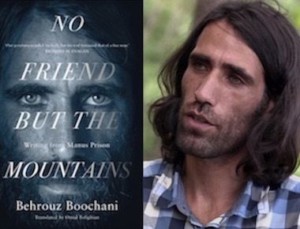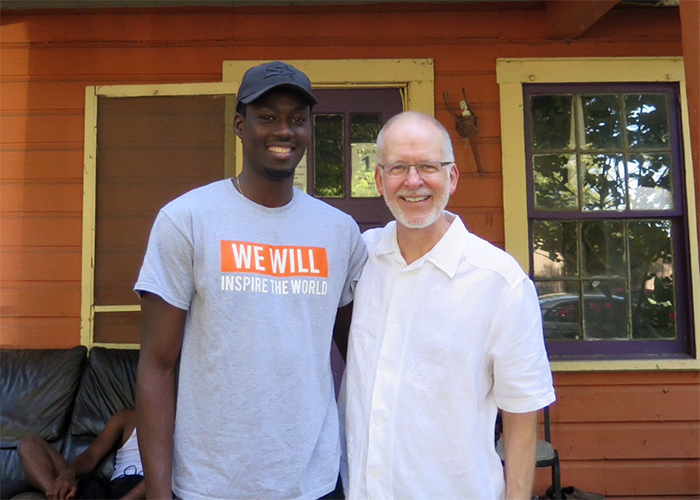Grace and peace!
As a staff member of Casa Marianella, I would like to invite y’all into conversation here, via the comments of this blog, around the overarching topic of immigration. It goes without saying (though I’ll say it anyway) that immigration greatly affects our broader community and our nation, and yet it’s a topic that we rarely talk about.
I mean really talk about. With open arms instead of fists and with inquisitive tones instead of shouting.
I acknowledge that blogs are not set up for (meaningful) conversation. For starters, written communication generally runs a higher risk of misinterpretation, given the lack of body language and vocal expression that is available (things that provide helpful nuance to our words, and things that emojis just can’t replace). Yet it is important for us to use a medium that allows for an educational context (which rules out more provocative platforms such as Facebook, Instagram, and Twitter) and an opportunity for us to digest new information before responding (which Zoom and other virtual meeting programs make difficult).
Maybe you are still wondering why there is a need for conversation at all. Maybe immigration as a whole doesn’t seem to impact your daily life. Asking these kinds of “why” questions are incredibly important, and so I want to take a moment to thank you for asking them.
I would also like to acknowledge the reality that immigrants are living among us, and often immigrants are us, whether we are aware of it or not. And so it’s less a question about “why,” and more a question about “what.”
What does it mean for our community to be comprised of native-borns and immigrants?
My hope is that as we engage in ongoing conversation around these “what” questions, we can slowly begin to delve deeper into the “how” questions.
How can native-borns and immigrants live together in genuine community (one that involves fellowship, not fear)?
But First, Allow Me to Introduce Myself
My name is Emily (or Emi), and I will be facilitating our conversation. I’ve been working with Casa Marianella for a little over a year, and I’m quite interested in dialoguing with people in our broader community who are equally passionate (or mildly curious) about immigration.
I am a white, Christian (Lutheran), cis-gendered and straight female. My thirty-something self was born and bred lower-middle class in south-central Pennsylvania. I score as an IS(T/F)J on the Myers-Briggs scale and as an enneagram 2wing1 (which means that, for better or worse, I have a helping personality with a distinctive streak of perfectionism). I moved to Texas in June of 2020, and I confess that I’m still acclimating to life here.
(I don’t think I’ll ever get used to the heat.)
But enough about me. This conversation is most assuredly not about me.
I share these things with you because it’s important to acknowledge the lenses through which we see the world, especially before entering into difficult conversations such as this one. In order to better understand who immigrants are, we (as native-borns) must first consider who we are.
A quick (but important) sidenote…
I’ve not shared my partisan leanings because I’m a firm believer that the truth of human experience is often found somewhere in the middle. It’s found in the space where we are in relationship with one another, which is the same space where meaningful conversations (ones that seek to understand instead of undermine) are able to blossom.
All this to say that nothing I write, however “political” sounding, is intended to invoke or support any one political party’s agenda. And to be clear, Casa is not affiliated with any political party or faith tradition.
And while we’re on the subject of “politics,” let it be known that my use of this word (which comes from the Greek word politiká, meaning ‘affairs of the cities’ – did I mention that I’m a seminary graduate?) is limited to describing the framework that groups of people create to help them make decisions and to distribute resources or power. Meaning that “politics” may generally involve partisanship (the favoring of one ideology over another), but it is not the same thing as partisanship. At least not for me and not in the context of this blog.
One More Thing – Our Conversation Needs Some Boundaries
As facilitator of this virtual dialogue, I want to ensure that it is a constructive one. In other words, there is no room for name-calling, finger-pointing, or any kind of inflammatory language. I’m warning y’all now that such comments will be deleted. By joining this dialogue, we are collectively agreeing to take responsibility for what we say and how we say it. My invitation to converse through the comment space of this blog is an invitation to ask questions when you’re unsure and to offer insight when you have it.
May we challenge one another’s perspectives with compassion.
May we open our hearts and minds to learning.
And may we build a community that is mutually supportive.
Okay, So Where Do We Begin?

We’ll begin by reflecting upon the words of Behrouz Boochani (a Kurdish-Iranian journalist with firsthand experience of the Australian immigration system).
He writes in his memoir No Friend but the Mountains that,
“Respect is central” (398).
Respect is often the greatest form of advocacy and support that we can give to another human being, including immigrants.
In the coming weeks, I hope that together we can define what respect looks like in relationship with the immigrants living within and among us.
In solidarity,
Emi

Looking forward to the chat!
Me, too!
How do you start a conversation about immigration with your family?
That is an excellent question, James! And I hear in it a care and concern for immigrants and for your family.
Starting the conversation is always the most difficult part, and I think it really depends on your family’s current perspectives on immigration. If they are open to it, maybe reading through the blog post discussions together and then talking about them as a family (in relation to your own experiences, beliefs, etc.) would be helpful. If not, your own learning and growth might inspire them to do the same. Feel free to email me directly at eorner@casamarianella.org and maybe we can figure out an approach that works best for you and your family.
Thank you for your interest in this conversation!
hello this is my comment to this blog
Hello, Cherry! It is good to virtually meet you.
What draws you to this conversation?
I feel like we’ve lost our way in our ability to care for others outside of well defined transactions. How do I engage in meaningful dialogue with those who focus primarily on fairness or “what’s mine”? Exchanging information alone is not enough and seems to instead lock people into their preconceived notions. How can I encourage emotional — or better — spiritual engagement with a divisive topic like immigration?
Thank you for your desire to get beyond the facts and into the depths of human experience, Leah! I would agree that exchanging information is not enough, and that being able to reach people where they are is a vital component of fruitful dialogue. This is why I’m beginning the conversation with an appeal to the need for immigrants’ human dignity to be honored (instead of diving headfirst into immigration law, migration causes, and other surface level – though important – immigration topics).
As for spiritual engagement, may I ask if there is a particular faith tradition or form of spirituality that you follow? I can only speak from my own Christian/Lutheran context, though I would be happy to provide you with some Christian-based resources if that would be helpful. They help to highlight the myriad ways that migration is present in Christian scripture (as is God’s call to care for the “stranger”). By bringing the conversation out of the partisan sphere and into our belief system, we are (ideally) able to shed God’s loving light on this divisive topic.
While in the end some people will (unfortunately) never be open to dialogue and growth, I am looking forward to working with you to find more and better ways to encourage engagement around this topic!
Hi, May be an unrelated question but what is the best way to help and get involved in helping refugees on the other side of the boarder (Mexico), we have had the opportunity to volunteer with RST on missions supporting refugees that have made it to Central Texas but what can we do for the huge amount of refugees just 4 hours away from us on the other side of the boarder. Are there some Mexican organizations that you can recommend connecting with?
Thank you
While unrelated, it is still an important question! There is so much chaos along the border right now, and I’m not sure at this point who’s doing what, but I do have some contact information for people who have been working in the Matamoros, Mexico area (which was a makeshift refugee camp during MPP). They might know of some Mexican organizations that you could partner with. Please send me an email at eorner@casamarianella.org, and I’d be happy to pass along that information. Thanks, Gustavo!